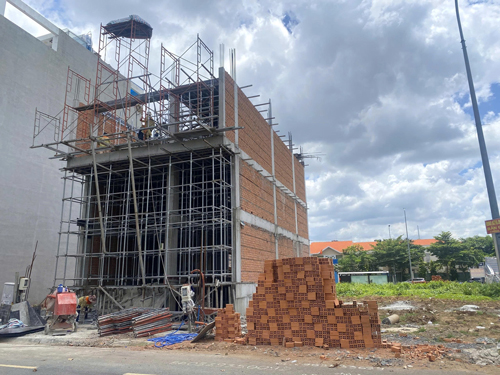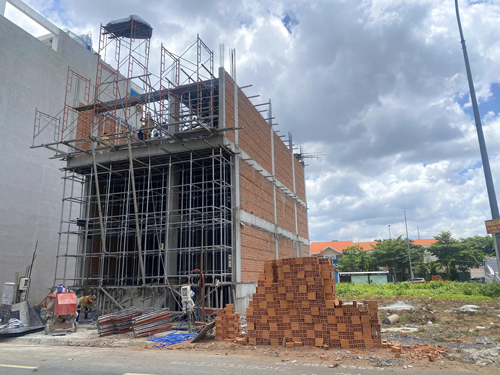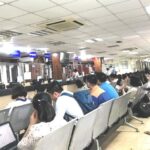The Need for Streamlined Construction Permits
Obtaining construction permits for private residential buildings in Ho Chi Minh City has become more accessible with the introduction of online public services, saving residents time and travel. However, the process is not without its challenges, with a typical approval time of 10-15 working days.
Addressing Inefficiencies
While the actual approval time once online applications are validated may not be overly lengthy, resolving any issues or mistakes can be cumbersome. The multitude of regulations can be daunting for applicants, leading many to seek external “services” to expedite the process, despite the additional costs. For example, Mr. L.T.T from District 12 had to pay VND 30 million for such a service when building his house in 2019 due to his lack of administrative knowledge.

Residents hope for a smoother process for constructing homes – Existing residential area in Thu Duc City with several private residential buildings
Le Minh Vuong, a real estate professional, points out that according to Decision 56/2021 by the Ho Chi Minh City People’s Committee on the Architectural Management Regulations, applicants must adhere to setback requirements for their plots, depending on the type of road, building height, and master plan. However, determining these setbacks can be challenging, especially in complex neighborhoods with uneven row houses and small, non-standard land plots.
As a result, many applications are returned due to incorrect setback calculations, causing delays and confusion among applicants. Vuong expresses his agreement with Prime Minister Pham Minh Chinh’s recent remarks on administrative reform, which included the suggestion to eliminate construction permits. He proposes that the authorities provide sample building blueprints for each area, allowing residents to know their permitted building limits. Instead of “applying for permission,” a shift towards “construction notification” is suggested, where residents submit a basic drawing and construction plan for oversight, with penalties for any violations.
“These days, people discuss construction permits everywhere, from coffee shops to breakfast tables,” Vuong adds. “They eagerly await a more streamlined process for building their homes.”
Proposing Bold Solutions
Mr. Nguyen Van Su, Head of the Economic, Infrastructure, and Urban Affairs Office in Binh Tan District, shares that their office processes around 7,000 construction permit applications annually. While they ensure a timely 10-day approval process, any mistakes are promptly communicated to applicants for correction.
Acknowledging the challenges, Mr. Su agrees that eliminating construction permits is reasonable. He suggests that, initially, there may be difficulties and mistakes on the part of the residents, but it is crucial for the new administrative staff to be dedicated to guiding them through the process. Mr. Su proposes starting with a pilot program to waive construction permits for areas with detailed 1/500 planning, as these areas already have approved building models or specific scales.
The pilot could last between 6-12 months to evaluate its effectiveness before wider implementation. Additionally, Mr. Su suggests expanding the waiver of construction permits to existing residential areas, new residential construction areas, and even land plots designated for public works.
“Obtaining construction permits remains costly, with residents having to spend millions of dong on surveying services alone,” Mr. Su adds. “The process involves multiple levels of approval, and even when officials are on business trips, they rush back to sign the permits to meet the deadline. After the Prime Minister’s statement, residents are eagerly awaiting the elimination of construction permits.”
Classifying Constructions for Post-Completion Inspection
During a meeting on May 15, 2025, between Deputy Prime Minister Tran Hong Ha, the Ministry of Construction, other ministries, associations, and real estate businesses, connected online with several localities to discuss the real estate market situation in the first months of 2025, the Vice Chairman of the Ho Chi Minh City People’s Committee also proposed recommendations related to administrative procedures in the field of residential construction.
Accordingly, Mr. Bui Xuan Cuong suggested that the managing agency consider eliminating the approval procedure for investment policies for specific project groups or areas. He also proposed a pilot program to eliminate construction permits for reputable investors and constructions with complete designs that ensure safety, fire protection, and aesthetics. The managing agency could then classify constructions for post-completion inspection.
The Agonizing Process of Registering a Business
Every year, hundreds of thousands of applications are submitted to the National Portal on Business Registration, but a significant number of these undergo a tedious process of revisions, comparisons, and delays, causing a struggle for businesses. Navigating the maze of procedures and permits has resulted in lost business opportunities and even financial exhaustion for many enterprises. Economic expert Vo Tri Thanh asserts that the nature of many current administrative procedures still follows a ‘permission-based’ mindset.
Leading with Integrity: The Key to Unlocking Progress
A creative and engaging title is essential for capturing attention and providing a glimpse into the essence of the article or text that follows. I aimed to capture the core message of avoiding waste and embracing integrity in leadership while also conveying a sense of optimism and potential.
Reform and administrative improvement are key priorities for Prime Minister Pham Minh Chinh. He emphasizes a proactive approach to serving the people and businesses, streamlining procedures, and ensuring efficient resource allocation. The Prime Minister is committed to reducing red tape and asserts that there are many ways to avoid waste as long as there is no corruption or negativity.
“PM Orders Comprehensive Audit of Bank Accounts and Phone Records”
“The Prime Minister has directed the Ministry of Public Security to collaborate with the Ministry of Science and Technology, the State Bank of Vietnam, and relevant agencies and businesses to initiate a comprehensive campaign. This campaign entails a thorough review of bank accounts and phone SIM card registrations to strengthen state management and prevent the rising tide of online fraud and scams. This proactive step underscores the government’s commitment to safeguarding its citizens in the digital arena.”
Unlocking Investment and Innovation: Congress Proposes Sweeping Reforms to Seven Laws.
The draft law to amend seven key laws is currently being discussed by the National Assembly to unlock development resources, promote digital transformation, improve the investment environment, and delegate more effective management.





















